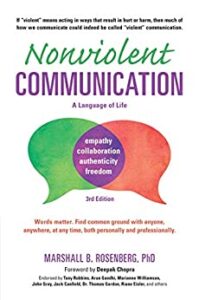Chapter 7 – Receiving Emphatically, page 91.
- The last four chapters described the four components of NVC: what we are observing, feeling, and needing, and what we would like to request to enrich our lives.
- Now we will apply these same four components to hearing what others are observing, feeling, needing, and requesting.
- We refer to this part of the communication process as Receiving Empathetically.
Presence: Don’t Just Do Something, Stand There
“True empathy requires listening with the whole being. Listening demands the emptiness of all faculties. And when the faculties are empty, then the whole being listens. There is then a direct grasp of what is right there before you that can never be heard with the ear or understood with the mind.” – Chuang-Tzu (Chinese philosopher)
- Empathy is a respectful understanding of what others are experiencing.
- Empathy with others occurs only when we have successfully shed all preconceived ideas and judgments about them.
- The presence that empathy requires is not easy to maintain.
- “The capacity to give one’s attention to a sufferer is a very rare and difficult thing; it is almost a miracle; it is a miracle,” asserts French philosopher Simone Weil.
- Instead of offering empathy, we tend instead to give advice or reassurance and to explain our own position or feeling.
- Empathy, on the other hand, requires us to focus full attention on the other person’s message.
- We give others the time and space they need to express themselves fully and feel understood.
- The following are behaviors that prevent us from being sufficiently present to connect empathetically with others:
- Advising: “I think you should…” “How come you didn’t…?”
- One-Upping: “That’s nothing: wait till you hear what happened to me.”
- Educating: “This could turn into a very positive experience for you if you just…”
- Consoling: “It wasn’t your fault; you did the best you could.”
- Story-telling: “That reminds me of a time…”
- Shutting down: “Cheer up. Don’t feel so bad.”
- Sympathizing: “Oh, you poor thing…”
- Interrogating: “When did this begin?”
- Explaining: “I would have called but…”
- Correcting: “That’s not how it happened.”
- Believing we have to “fix” situations and make others feel better prevents us from being present.
- The key ingredient of empathy is presence: we are wholly present with the other party and what they are experiencing. This quality of presence distinguishes empathy from either mental understanding or sympathy.
Listening for Feelings and Needs
- In NVC, no matter what words people use to express themselves, we listen for their observations, feelings, needs, and requests.
- Listen to what people are needing rather than what they are thinking.
Paraphrasing
- After we focus our attention and hear what others are observing, feeling, needing, and what they are requesting to enrich their lives, we may wish to reflect back by paraphrasing what we have understood.
- If we have accurately received the other party’s message, our paraphrasing will confirm this for them.
- If, on the other hand, our paraphrase is incorrect, we give the speaker an opportunity to correct us.
- NVC suggests that our paraphrasing take the form of questions that reveal our understanding while eliciting any necessary corrections from the speaker. These questions should ask:
- What other’s are observing: “Are you reacting to (observation)?
- What others are feeling: “Are you feeling (feeling) because you would like more (need)?”
- What others are requesting: “Are you wanting me to (request)?”
- These questions require us to sense what’s going on within other people while inviting their correction, should we have sensed incorrectly.
- There are no infallible guidelines regarding when to paraphrase, but as a rule of thumb, it is safe to assume that speakers expressing intensely emotional messages would appreciate our reflecting these back to them.
- All criticism, attack, insults, and judgments vanish when we focus attention on hearing the feelings and needs behind a message.
- Simple Truth: Behind all the messages we have allowed ourselves to be intimidated by are just individuals with unmet needs appealing to us to contribute to their well-being.
- Therefore, a difficult message becomes an opportunity to enrich someone’s life.
- Some people resist paraphrasing as a waste of time, but studies in labor-management negotiations demonstrate that the time required to reach conflict resolution is cut in half when each negotiator agrees, before responding, to accurately repeat what the previous speaker had said.
Sustaining Empathy
- I recommend allowing others the opportunity to fully express themselves before turning our attention to solutions or requests for relief.
- When we proceed too quickly to what people might be requesting, we may not convey our genuine interest in their feelings and needs; instead, they may get the impression that we’re in a hurry to either be free of them or to fix their problems.
- An initial message is often like the tip of an iceberg; it may be followed by as yet unexpressed, but related – and often more powerful – feelings.
- What evidence is there that we’ve adequately empathized with the other person?
- First, when an individual realizes that everything going on within has received full empathetic understanding, they will experience a sense of relief.
- We can become aware of this phenomenon by noticing a corresponding releaser of tension in our own body.
- A second, and even more obvious sign is that the person will stop talking.
When pain Blocks Our Ability to Empathize
- It is impossible for us to give something to another if we don’t have it ourselves.
- If we find ourselves unable or unwilling to empathize despite our efforts, it is usually a sign that we are too starved for empathy to be able to offer it to others.
- We need empathy to give empathy.
- If we openly acknowledge that our own distress is preventing us from responding empathetically, the other person may come through with the empathy we need.
- At other times, it may be necessary to provide ourselves with some “emergency first aid” empathy by listening to what’s going on in ourselves with the same quality or presence and attention that we offer to others.
- If we become skilled at giving ourselves empathy, we often experience in just a few seconds a natural release of energy that then enables us to be present with the other person.
Summary
- Empathy is a respectful understanding of what others are experiencing.
- We often have a strong urge to give advice or reassurance and to explain our position or feeling.
- Empathy, however, calls on us to empty our minds and listen to others with our whole being.
- In NVC, no matter what words others may use to express themselves, we simply listen for their observations, feelings, needs, and requests.
- Then we may wish to reflect back, paraphrasing what we have understood.
- We stay with empathy and allow others the opportunity to fully express themselves before we turn our attention to solutions or requests for relief.
- We need empathy to give empathy.
- When we sense ourselves being defensive or unable to empathize, we need to:
- Stop, breathe, and give ourselves empathy.
- Scream non-violently.
- Remove ourselves from the situation and take a time out.

